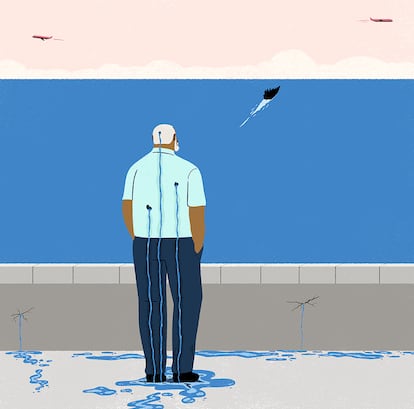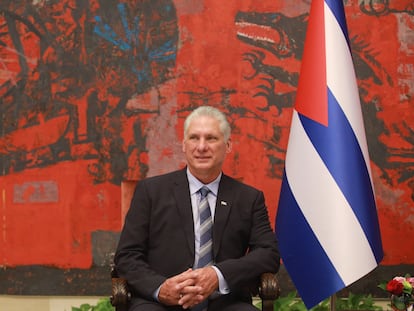More dust in the wind
Exile has been a substantial part of Cuba since the nation’s origins, but the current wave of migration appears to be the largest in history

My friend Eduardo came by to give me the news: he already has all the necessary documents, and has even bought the plane ticket. In two weeks he will leave Cuba, almost certainly never to return: he has undersold his house, with everything he had inside. Eduardo is going to join his two children in Lima, who emigrated eight and two years ago and settled there.
My friend Eduardo is a contemporary of mine and, like me, a lifelong resident of the Havana neighborhood of Mantilla. Or he was until now. Our friendship must be as old as we are, but the first image I have of him is from the first day of the school year in 1960, when we started the first grade at what was still called Plantel Juventud. As we were lining up for the Civic Act that opened the year — we sang the National Anthem, saluted the flag, and listened to a speech from the school principal — a teacher took Eduardo by the hand and walked him to the end of the line of “the men”: although Eduardo was the youngest, he was also the tallest of us all and had to go at the end of the line. Eduardo always had red hair and a freckled face that earned him the nickname El Colorao. Like me, he now has more gray hair than red hair, but he is still El Colorao and I am sure that we have been friends since that day in my memory.
Eduardo has a degree in geography. And he was always an excellent professional, with notable knowledge of topics such as cartography, the geological study of soils and other subjects. Two years ago, upon reaching the age of 66, after decades of work, he retired. The pension assigned to him is about 2,000 Cuban pesos. But it so happens that today, in Cuba, a carton of 30 eggs is priced at 3,000 pesos. With his retirement check, Eduardo would not be able to eat an egg every day. That’s also why he’s leaving. Like his children, he is leaving. Another friend that flies away, like dust in the wind.
A few days earlier I had said goodbye to Kike, another old friend. He moved to Spain with his daughter and grandchildren. His departure leaves me with a huge void, not only sentimental, but also practical. Kike was, as my wife and I called him, “the man of the house.” He was a carpenter, plumber, bricklayer, painter, sometimes even (against his wishes) an electrician. Kike solved all our domestic problems and from his hands came, over many years, several of the pieces of furniture that we use: shelves for books, a table and dining room chairs, wooden doors.
Kike is 78 years old. He is also a Mantillero by birth and never thought of leaving, not even from Mantilla. But he is gone. His retirement money, by the way, was around 1,500 pesos and, for this reason, he never stopped working in whatever turned up, despite his bone pain and persistent stomach discomfort.
Now I have just found out that Dr. Esperanza is also leaving. We were schoolmates and she was once my girlfriend, about a century ago. She is going to Tampa to meet up with her daughter whom she has not seen in 10 years and with the two grandchildren she has never met. And she is leaving for good, never to return.
Eduardo, Kike, Esperanza are some of the few old friends I had left in the neighborhood. Over time, I have seen many leave and have even attended the wake of others. Like dust in the wind, those friends have dispersed and left me here, feeling increasingly alone and more nostalgic. Each one who walks away is a loss, not only physical, but also mental: they take with them a piece of shared memories that I could only discuss with them. And that hurts, like the amputation that it is.
Why do so many leave? Why people like them, who are already part of the senior citizens’ club, who will hardly be able to do anything in those destination countries to earn a living? They leave because their loved ones call to them, but also because they are tired. It is a heavy historical fatigue that takes shape in a present that does not resemble the future that was promised to us, the one that we deserved after years of work and sacrifices. They leave because here, in their country, they lived off what another friend from the neighborhood calls “donations”: financial aid from family and friends living abroad.
The children and grandchildren of my contemporaries did not wait that long. Many decided to change their present, aspire to another future and, to achieve this, they emigrated. The children and grandchildren of my generation have not thought twice about it, they have left and they continue to leave through any loophole, towards any destination.
If it were necessary to illustrate the proportions of this national bleeding in transit, there are the figures that the U.S. Customs and Border Protection (CBP) has recently made public. Between October and November 2023 alone, 38,154 Cubans entered the United States irregularly. The majority did so through the Mexican border where they usually arrive after taking the “coyote route” from Nicaragua, through Central America and Mexico. The cost of this journey is around $10,000 per person and there is already a network of traffickers who organize the journey.
Thus, through legal channels such as the so-called humanitarian parole established in January 2023 by the Biden administration for emigrants who have a “sponsor” in the U.S., plus those who have done so through irregular routes, more than 650,000 Cubans have emigrated to the United States alone in the last two fiscal years. And how many, like my friends, have left for other destinations such as Spain, Peru, Argentina, Russia or wherever they can go? The figure is shocking when placed next to the census of 11.26 million citizens residing on the island that were counted in 2021 — a figure that included many who had already emigrated.
Exile has been a substantial part of Cuban history since the origins of the nation. The first man who proclaimed his Cuban sentiment and immortalized it in his writing was the poet José María Heredia, who in 1823 fled the island, wanted for his independence activities. It is a destiny that has followed us ever since and continues to pursue us despite the nationalist attitudes we display. And also despite the fact that, as Milan Kundera said, “no one leaves the place where they are happy.”
The current migratory wave, which these friends have joined, seems to be the largest in national history. And it is, without a doubt, the reflection of the dissatisfaction of so many people who prefer experiencing the distance and all the dramas implied by exile than remaining in their own place waiting for the bright future that does not light up, that never arrives.
In my novel Como polvo en el viento (Like dust in the wind) I tried to outline a chronicle of the reasons and results of the diaspora of my generation and the batch of those who could well be my children and grandchildren. But reality is usually more powerful and painful than fiction, and today we are seeing how a country is losing not only young people who are pursuing a less uncertain future, but also people like my old friends, in search of a future that undoubtedly contains a lot of uncertainty, in which they will suffer nostalgia and feel losses, but in which at least they will have the closeness of their loved ones and, among other things, perhaps find relief for so much historical fatigue and, I hope, also the solace of an emotional memory that makes them fondly evoke the many coffee brews that I made for them right here, in my house in Mantilla.
Sign up for our weekly newsletter to get more English-language news coverage from EL PAÍS USA Edition
Tu suscripción se está usando en otro dispositivo
¿Quieres añadir otro usuario a tu suscripción?
Si continúas leyendo en este dispositivo, no se podrá leer en el otro.
FlechaTu suscripción se está usando en otro dispositivo y solo puedes acceder a EL PAÍS desde un dispositivo a la vez.
Si quieres compartir tu cuenta, cambia tu suscripción a la modalidad Premium, así podrás añadir otro usuario. Cada uno accederá con su propia cuenta de email, lo que os permitirá personalizar vuestra experiencia en EL PAÍS.
En el caso de no saber quién está usando tu cuenta, te recomendamos cambiar tu contraseña aquí.
Si decides continuar compartiendo tu cuenta, este mensaje se mostrará en tu dispositivo y en el de la otra persona que está usando tu cuenta de forma indefinida, afectando a tu experiencia de lectura. Puedes consultar aquí los términos y condiciones de la suscripción digital.










































